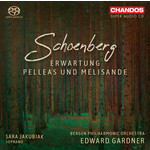
Schoenberg: Erwartung, Op.17 / Pelleas und Melisande, Op.5
 $40.00
Low Stock
add to cart
$40.00
Low Stock
add to cart
ARNOLD SCHOENBERG
Schoenberg: Erwartung, Op.17 / Pelleas und Melisande, Op.5
Sara Jakubiak (soprano) / Bergen Philharmonic Orchestra, Edward Gardner
[ Chandos SACD / Hybrid SACD ]
Release Date: Friday 1 May 2020
Should this item be out of stock at the time of your order, we would expect to be able to supply it to you within 2 - 5 business days.
Written only six years apart, these two works share a common narrative of frustrated love, and the concept of the forest as a metaphor for the subconscious mind. Musically they are wildly different, however; Pelleas, which Schoenberg wrote in his late twenties, is the epitome of his late romantic style, indebted to Richard Strauss. Erwartung (his first work for the stage) was written after his conversion to atonality. Maurice Maeterlinck's play Pelléas et Mélisande fired the imaginations of several of the greatest composers of the time. Debussy began writing his opera almost immediately after its publication in 1892, and within a decade or so Fauré and Sibelius had created elaborate incidental scores for different stage productions of the play. Schoenberg composed his tone poem in 1902 - 03, for a large-scale (Straussian) orchestra. Schoenberg seems to have put himself into a state of free association to write Erwartung, which he completed in just seventeen days in August 1909. 'In Erwartung, the aim is to represent in slow motion everything that occurs during a single second of maximum spiritual excitement, stretching it out to half an hour', he wrote. Not only the first solo opera, this is perhaps also the first cinematic one.
"Listening to these two works back-to-back, it is hard to imagine that they were composed by the same person and only four or five years apart. Pelleas und Melisande is often regarded as the last major high point of Romanticism but also subtly pointing to the future development of music and Erwartung is one of the great icons of musical expressionism. Not everyone will agree with this assessment, but it might be a fair starting point for an appreciation and assessment of these two works....Stunning performances." MusicWeb
"Gardner is swift but never careless [in Pelleas]...Erwartung holds exceptional appeal for Sara Jakubiak's intense restraint, her conversational familiarity with the text and the luminous rapture of her singing...For this coupling it's an obvious first choice, but also a first port of call for anyone still resistant to the idea that Expressionist Schoenberg can, and should, sound beautiful." Gramophone
"Few of the conductors and sopranos who have teamed up on record (or in the theatre) make Erwartung sound more natural than Edward Gardner and Sara Jakubiak. Jakubiak sings with an agility that sounds ideal, avoiding any hint of the squalliness that all too often feels like an inevitable part of the Erwartung soundscape...a sympathetic account of the work with few real rivals on disc." Opera



